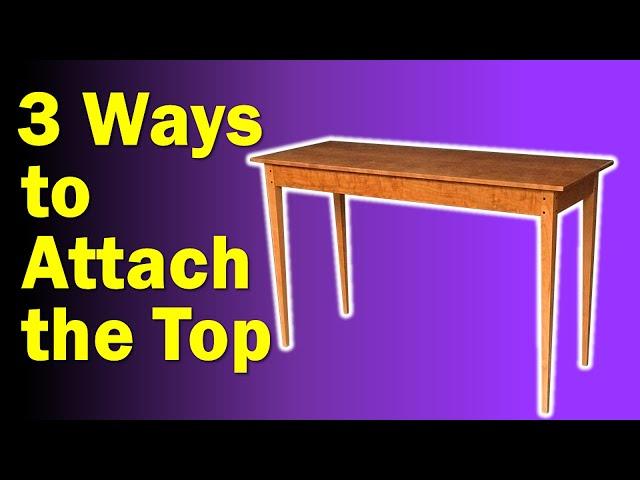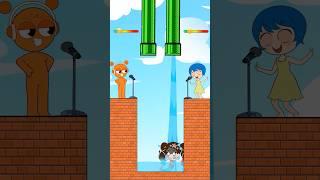
3 Methods to Attach a Table Top - DIY Furniture
Комментарии:

That was really on the button, top tips!
Ответить
Hello. I found your videos about 2 months ago and have watched dozens of them since. I LOVE them and your work. Thank you for doing the videos. I am a retired American living on the coast in the Philippines. I have a 4" X 36" X8' slab of bitaoag (a native hardwood species) and some 4" X4" pieces that have been air drying for about 2 years. I would like to make a large dining room table from them. How would you suggest attaching the legs to the top? Thank you very much for any suggestions.
Ответить
it did help. how would you make a curved apron? solid wood or lamination. and how would you cut out for the curved drawer front? would be a cool video to watch.thks
Ответить
Thank you for the great lesson
Ответить
So for an mdf tabletop on a softwood apron I can just straight up glue it straight on our pocket hole screw or on? Mdf won’t expand etc
Ответить
Hello Mr cosman, as I watched this i was sawing at my bench, and even made a "button" really fast. Lol. After I did it and thought about it, it hit me like a ton of bricks. Lol. The, oh ok moment. But I have a question. I am a all hand tool "shop" in my living room. If you want to do something you will find a away. But could you cut a groove all the way around like the bottom of a box or drawer bottom?
Ответить
Which one would be the strongest for a heavy kitchen kart/island that will be moved around occasionally? Hardwood butcher block top on pine aprons, no casters. I like the idea of dowels but I'm afraid eventually they'll loosen, or split out of the pine over time.
Ответить
I learned a lot. Thanks for sharing/teaching.
Ответить
I've been thinking about this today and it occurred to me that the Polynesians and other boat builders solved this brilliantly thousands of years ago.
Take a look at how sewn boats attach planking to framing.
They used, some still use rope/twine to make the connection. Planks would have raised eye hole sections next to framing members, then rope/twine is wrapped through the eyes and around the frames or through holes in the frames, then the separate legs of rope/twine are wrapped/frapped together to cinch them tight.
No nail/screw rust damage to wood. No breaking screws. No glue. Anyone can repair very easily without any tools but a knife to cut twine.

Just saved my a trip to get Z clips. Thank you.
Ответить
"some people may not have access to a 4 inch screw" proceeds to show us end bits, presses and all the equipment used instead of sourcing 4" screws... come on man lol
Ответить
The dowel solution is pretty clever, and adds visual interest with the last iteration featuring the through dowel. I've always used figure 8 fasteners but maybe I'll give the dowell method a go next time.
Ответить
Question about the buttons: why not just screw the button to the top instead of screw and glue? Doesn’t the glued button prevent future removal of the top, should it become necessary in the future?
Ответить
Cool. Thnx Rob. Saved my bacon..
Ответить
I don't see any room for movement using the dowels on the cross grain end of the table (usually the short apron).
Ответить
Woodglut has a very large project base.
Ответить
What about using figure eight washers.
Ответить
How wide should table legs be?
Ответить
Hi, and thank you. I have a question. What if the table top is made out of plywood? How does it affect the way you attach it to the frame?
Ответить
Oh this is an elegant solution
Ответить
Thank you
Ответить
Just buy a second hand table . You literally can't give tables away , no need to chop down the rainforest at all.
Ответить
Wow! Thanks for a great video
Ответить
Everyone needs an APFSDS tank round in their workshop 🙃
Ответить
No way am I gonna watch this doofus be over detailed
Ответить
I love watching your videos and absorbing all this acquired knowledge of years. The 2 washers to prevent it from embedding in the wood is genius and something that nobody would know unless they've had experience to tell them or been taught by someone such as yourself. It seems so simple when someone explains it, but I imagine it can save a ton of effort and heartache if a table splits 10 years down the line.
Ответить
had a good sleep.
Ответить
Just. thank you!😊
Ответить
Great video Rob. You've given me a great idea. I love the dowel thing. It looks very classy.
Ответить
Just the information I was looking for. Thanks
Ответить
Thank you very much. This has been very helpful for this beginning woodworker.
Question: I am planning to build a workbench with the top made of 2x4s laid on edge. Will the lateral movement of the wood laid on edge be significant enough to require this special joinery?
Thank you again.

Excellent tutorial with thorough and clear explanations. My only question is do you glue the aprons to the table top?
Ответить
I have s vintage dining table that has no way of attaching the top to the base. Please help. Diameter is 40”.
Ответить
For the first one, why can't I just pocket screw it?
Ответить
Is this still necessary if e.g. you put a c-channel / and used metal legs for the bottom (more of a slab technique), or is this only necessary when the table legs are also made of wood and you're getting expansion there as well as the top?
Ответить
Its not going to move that much. Cherry would move .01-.02 of an inch
Ответить
Rob how do you get those upraised ridges on your clamps?
Ответить
When using a softwood for the apron, do you use hardwood for the dowel?
Ответить
This is kinda driving me crazy. Wood DOES move longitudinal. Altough, at around 0.01%, it's very little, but depending on the length of your workpiece and your jointing methods, it could be a significant factor. Take your stiles for a closet/wardrobe for example. Those doors can easily be as high as 70 inch or 6 ft or whatever, and at this length, your movement could be as worse as 0,5 - 0,7 inch. Good luck opening your resessed door half year round, with just 1/16 inch gap around it.
Ответить
Hi Rob, do you think the buttons need to necessarily be glued to the top? Planning to use it in a bench and would like to be able to disassemble in the future to refresh the surface, but also don’t want to compromise the stability.
Ответить
Liked the last one
Ответить
Really enjoyed your video and I am just finishing an end table out of Cherry and Maple and will use a Festool Domino to make the hold down buttons and the slots. I like your explanations and teaching points. Well done.
Ответить
I usually don’t watch long instructional videos, but I’m glad I watched every minute of this one. I’ll probably watch it several more times as I try these methods. Thank you for teaching me!
Ответить
Loved your complete methods to fasten aprons to table top, which I could apply to fastening corbeled to table top to legs espicaly the your dowel method Thanks
Ответить
Hi Rob, just in case youre still answering questions. Im trying this out on a rable im making, and dumb question maybe... should i stain and finish the table top and frame before or after screwing the table top to the frame?
Ответить
I'm lost. Thought the one parallel to the top didn't need special treatment.
Ответить
do you have any videos for making an aquarium stand?
Ответить


























